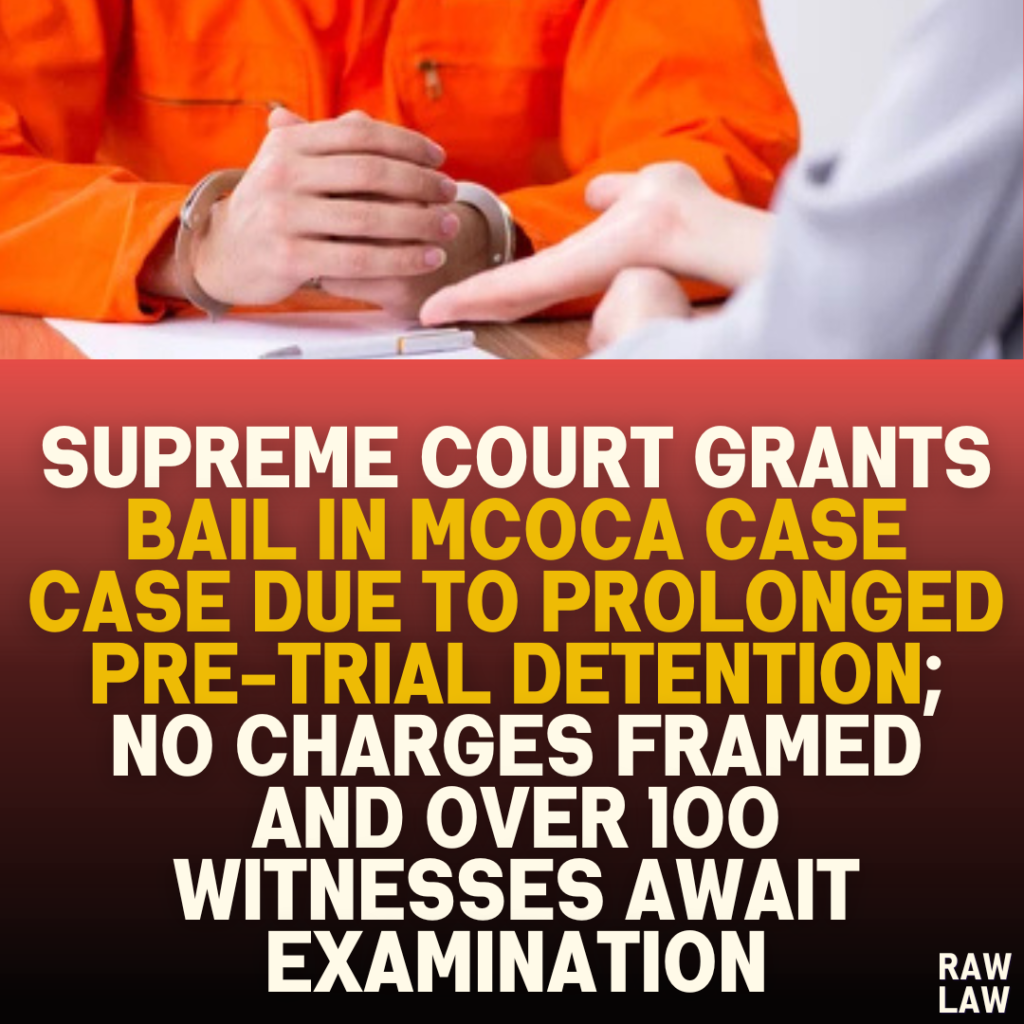Court’s Decision:
The Supreme Court granted bail to the petitioner in a case under the Maharashtra Control of Organized Crimes Act (MCOCA), citing significant delays in trial proceedings. The petitioner had been in custody since 2021, but charges had not yet been framed. Given that more than 100 witnesses were to be examined, the Court found continued detention unjustified and ordered the petitioner’s release on bail, subject to conditions imposed by the Trial Court.
Facts:
The case originated from Crime No. 922 of 2020, registered at P.S. Hadapsar, Pune, Maharashtra. The petitioner was charged with multiple offenses, including those under the Indian Penal Code (IPC) Sections 364A (kidnapping for ransom), 384 (extortion), 386, 388, 323, 506(2), 143, and 120B, along with Sections 3(1)(ii), 3(2), and 3(4) of MCOCA. The petitioner was arrested on March 4, 2021, and named as an accused in a supplementary charge sheet filed on July 15, 2021. Despite this, charges had not been framed, and the prosecution had listed 101 witnesses to be examined.
Issues:
The key issue before the Court was whether the petitioner should be granted bail given the prolonged pre-trial detention and uncertainty regarding the completion of the trial due to the large number of witnesses.
Petitioner’s Arguments:
The petitioner argued that the delay in framing charges, combined with the extensive list of witnesses, made it uncertain when the trial would conclude. The petitioner had been in custody for over two years without any substantial progress in the trial, and thus sought release on bail.
Respondent’s Arguments:
The State opposed the bail application, citing the petitioner’s involvement in other criminal offenses using a similar modus operandi. It was argued that releasing the petitioner on bail would be against the interests of society, given her alleged criminal antecedents.
Analysis of the Law:
The Court considered the right of an accused to a fair and timely trial. In light of the fact that charges were yet to be framed and a significant number of witnesses remained to be examined, the Court found that prolonged detention without trial would be against the principles of justice. The petitioner’s extended detention as an under-trial prisoner, without foreseeable progress in the case, warranted reconsideration of her bail application.
Precedent Analysis:
Although no specific precedents were cited in this order, the Court’s reasoning was aligned with established jurisprudence emphasizing the importance of not subjecting an accused to prolonged pre-trial detention, especially when the trial is likely to be delayed.
Court’s Reasoning:
The Court noted that despite the seriousness of the charges, the petitioner had already been in custody since March 2021, and no charges had been framed against her. Given that more than 100 witnesses were to be examined, the trial was unlikely to conclude in the near future. The Court reasoned that continued detention would not be justifiable under these circumstances.
Conclusion:
The Supreme Court granted bail to the petitioner, subject to conditions set by the Trial Court. It was made clear that should the petitioner be found involved in similar offenses in the future, the prosecution would be entitled to move for cancellation of bail. The Court disposed of the special leave petition accordingly.
Implications:
This decision reinforces the judicial principle that under-trial detention should not be unnecessarily prolonged, especially when the trial is delayed and there is no certainty as to when it will conclude. It also highlights the balance courts must strike between societal interests and the rights of the accused to a timely trial.



